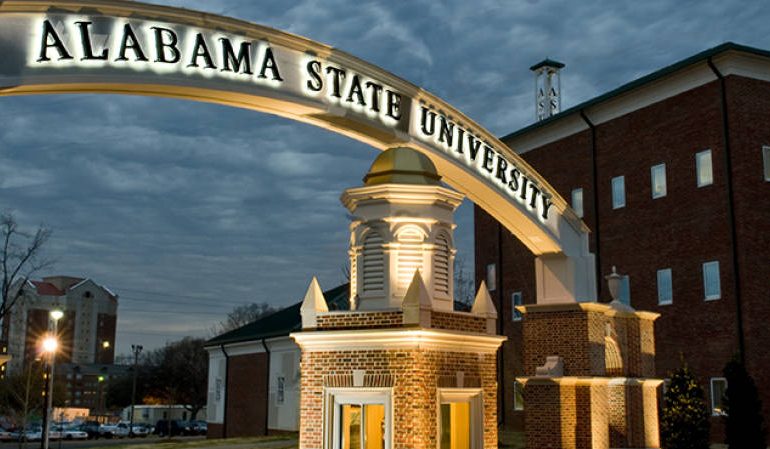Nigerians, numbering 41, who were granted full scholarship to study at Alabama State University, have sued the institution for acts of discrimination spanning years.
During the Goodluck Jonathan administration, the students each got full scholarships from a government fund for four years of education.
A lawsuit was last week filed by the Nigerians, some of whom have graduated from the university.
According to The Daily Beast, they accused the school of charging them excessively for books and meals, enrolling them in classes they never took, and other discriminatory acts.
The school was alleged to have inflated the costs of books, hostels, and used funds paid by the Nigerian government to sort out the school’s “bond issues”, pay for “a new stadium,” and a center for civil rights awareness.
Julian McPhillips, an attorney who filed the lawsuit said, “because of their Nigerian national origin,” they were not “being treated like other students”.
“They called us cash cows. I’m a black man and I’m proud to be black, but I felt discriminated against”, said Jimmy Iwezu, a former student of ASU.
“The school compelled us to buy books from the book store and eat only at the cafeteria. I tried to make them understand, ‘Hey, we don’t want to live in the dorms anymore, and we don’t want to eat our entire meals at the dorms.”
“They want our money. They make us pay $3,000 [a semester] to live in the dorms, and that is more than a mortgage on homes in this area. Enough is enough.”
Speaking in the same vein, Kehinde Batife, a graduate of criminal justice said: “We looked at what happens with other students when they are given refunds and compared it to our student accounts. We would see a refund, but before we could do anything about it, the refund was taken out.”
“They had me as if I was going to school this summer. I asked them, ‘I graduated in May, so where is the scholarship money my government gives to you?’”
“They tell me, ‘You’re a resident of the scholarship.’ So they think they can do whatever they want with the money [Nigeria] gives them…I’m not going to let them treat us like animals.”
“I’ve been here three years and I’m a super intelligent person. I’m not nosy, but I ask questions, and this school thought we don’t know anything and they could do whatever they want to us.
“I cannot forget about this and I’m ready to fight the school, even if it means 10 years from now I’m still fighting to get justice.”
THE INITIATOR
In 2013, David Iyegha, doctor and geography professor at ASU, in collaboration with the Nigerian government, facilitated the relocation of Nigerian students to Montgomery, Alabama.
Iyegha said $30,000-$35,000 was allocated annually for each student by the Nigerian government.
“I went to Nigeria with one other faculty member and recruited these students to be sponsored by the Nigerian federal government”, said Iyegha who worked at the school for almost three decades.
“I feel very, very bad because I was the one who was instrumental in bringing these students to the campus.
“[Nigeria] paid for everything, including their books, and all of the money is supposed to be given to the students so they can buy this or that.
“But the college refused to release any of that money at all for the past three years. I asked them, ‘Why are you treating these kids like this? Why are you depriving them?’ and after talking to them at length, they told me they spent all the money and there is no money left.”
KINGSLEY KUKU’S INVOLVEMENT
Kingsley Kuku, special adviser to ex-president Jonathan, in May 2015 reportedly wrote a scathing letter to Gwendolyn Boyd, ASU’s president.
Kuku’s letter was said to have accused ASU of “discriminatory practices” and breach of fiduciary duties.
Subsequently, a delegation was sent to the institution to demand that “all credit balances for tuition be carried over for each student and be used as initial deposit for the next semester fees” while also asking for a refund of the funds allocated for the students.
About six months later, the situation had not yet changed, hence McPhillips wrote ASU, urging the institution to “treat them [the students] justly from an economic perspective” and refund portions of “tuition, books, room and board, especially for the summer semesters of 2015 and 2016, and all personal expenses not used.”
Two months later, Kenneth Thomas, ASU’s general counsel, replied saying: “There is no financial agreement between the University and the individual Nigerian students.”
Thomas maintained that if there were any refunds to be given, it would be paid to the Nigerian Government and not to the individual students.
“Alabama State University denies your claim”, he added.
Copyright 2024 TheCable. All rights reserved. This material, and other digital content on this website, may not be reproduced, published, broadcast, rewritten or redistributed in whole or in part without prior express written permission from TheCable.
Follow us on twitter @Thecablestyle

